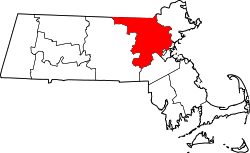Waban, Massachusetts
Waban is one of the thirteen villages of Newton, Massachusetts, a suburban city approximately seven miles from downtown Boston.
Origin of name
Waban was named for Waban, the first Massachusett Indian converted to Christianity, in 1646. Although Waban lived in Nonantum, a hill in the northeasternmost part of Newton, the area around the present village of Waban was a favored hunting ground. Dr. Lawrence Strong, in his history of the town, wrote:
My father, William Chamberlain Strong, was very active in securing the right-of-way for the Boston and Albany Railroad at the time the Newton Circuit Road was built. The location of a station here marked a potential village, and a name was required. My father had previously lived on Nonantum Hill in Brighton, where Waban, the Chief of the Indian tribe Nonantum, had his wigwam, and where Eliot, the Apostle to the Indians, preached. A memorial marks this spot today. So the name "Waban" for the new village easily suggested itself to my father. I am told Waban, or Wabanoki, means "east" in the Indian tongue. The spelling of the name cannot be held to coincide with its pronunciation. I believe the pronunciation is correct and the correct spelling would be either Wauban or more probably Waughban.[1]
Education
Waban has two elementary schools, Angier and Zervas (formerly Beethoven).
The village was one of four in Newton to retain its branch library until June 2008. As of September 2009, the Waban branch library has re-opened as the Waban Library Center, a community-based facility.
Poor farm
An area near where the shopping area of Waban now stands was originally the site of a working farm for the indigent.
Zip code ranking
In the Washington Post's 2013 study of the most affluent and well-educated zip codes in America, Waban (02468) ranked third in the nation. The study was based on an index of the percent of college graduates and median household income in each of America's zip codes. It ranked only behind Kenilworth, Illinois and Short Hills, New Jersey, making it the most affluent zip code in the state.[2]
Notable people
- Ralph Waldo Emerson (and maybe Henry David Thoreau)
- Roger Kellaway, Grammy winning Pianist, Composer, created works for orchestra, chamber ensemble, and jazz big band, as well as for film, TV, ballet and stage productions
- Robert Morse Tony award-winning actor
- Jack Lemmon was born in an elevator at Newton-Wellesley Hospital in Waban
- Ric Ocasek, music producer and vocalist for The Cars. Resident of Waban during the 1980s.
- Fritz Richmond, folk musician, played jug and washtub bass in the Jim Kweskin Jug Band
- Mark Sandman, rock and roll musician, singer, and songwriter, member of the groups Treat Her Right and Morphine
- Jason Varitek (and family), catcher, Boston Red Sox, 2004 and 2007 World Series Champions.
- Atul Gawande (and family), surgeon, writer, global and public health advocate.
- Scooter Livingston, cultural icon, grew up and resided in Waban from 1956-1985.
- Henry Lawrence Southwick, Author, Actor and 3rd President of Emerson College (1908–1932)
- Kevin Wu, Actor and co-founder of The Imagination agency.
See also
- List of Registered Historic Places in Newton, Massachusetts
- Waban
- Waban (MBTA station)
- Waban, the Wind by Arthur Morris Southwick (of Waban)
References
- ↑ Lawrence Watson Strong, "History and Tradition of Waban."
- ↑ https://www.washingtonpost.com/sf/local/2013/11/09/washington-a-world-apart/
Coordinates: 42°19′40″N 71°13′38″W / 42.32778°N 71.22722°W
